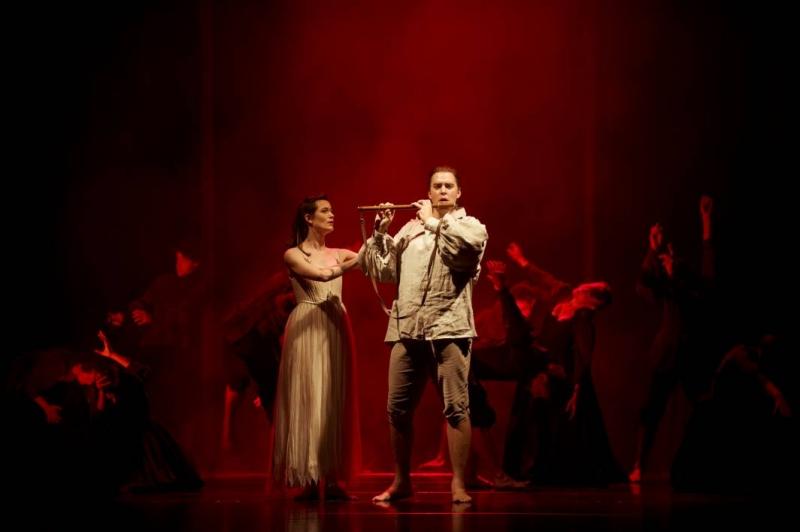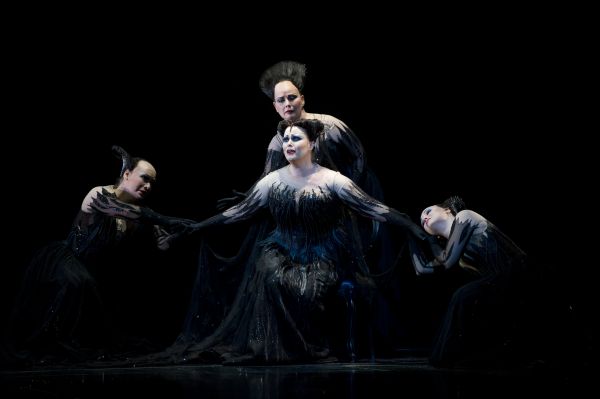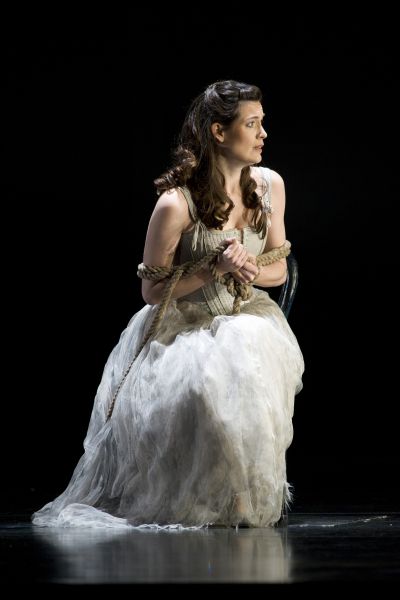Die Zauberflöte, Royal Opera | reviews, news & interviews
Die Zauberflöte, Royal Opera
Die Zauberflöte, Royal Opera
A classic production has lost none of its magic

“Tumult and peace, the darkness and the light – were all like workings of one mind.” Writing almost a century after Mozart’s Die Zauberflöte, Wordsworth was still contemplating the essential duality of the sublime – that greatest of Enlightenment legacies. Rationalism, order and science, we are reminded, are only the admissible part of an age that would also beget the sinister fantasies of Romanticism and the Gothic – those most pernicious of bastard offspring.
Darkness falls, the Overture’s threefold chord unfurls, releasing the scampering string lines of the Allegro, and suddenly the gloomy aisles and balconies of the Royal Opera are punctured with lights – glowing orbs clutched with awed care. Even on a third viewing, McVicar’s opening still bewitches, not least for the elegant precision with which it dramatises the musical text. In the pit once again, Colin Davis set a pace of control rather than release, risking just a flicker of subversion in the emphatic dissent of the brass’s closing offbeat flourishes.
Uncharacteristically however this pace was not to last, giving way to an Act One that felt perpetually on the back foot, with singers hauled from episode to episode by some rather officious hustling from the orchestra. Act Two did settle, arriving thankfully at “Ach, ich fühl's” in an altogether more accommodating spirit and enabling the evening’s finest moment from Kate Royal, shadow of Margaret Price hovering close by. With such a point of comparison it becomes harder to accept the seeming inevitability of first-night fisticuffs between stage and pit elsewhere; ensembles (the trio of Ladies and Christopher Maltman’s Papageno being repeat offenders) lost a full beat on several occasions, clambering back on board at cadences with ungainly rhythmic contortions.
 Fortunately with John McFarlane’s designs and Paule Constable’s painterly lighting there was plenty to delight the eye when the ear failed. Vertical pillars provide not only the Enlightenment absolutes of Sarastro’s temple, but also cast the shadows and frame the dark corners where Monostatos and his fellows lurk. Exposed to his greedy gaze in Act Two, we saw Royal’s Pamina stretched out asleep as if the heroine of Fuseli’s The Nightmare, with Monostatos himself the incubus gazing boldly out at us.
Fortunately with John McFarlane’s designs and Paule Constable’s painterly lighting there was plenty to delight the eye when the ear failed. Vertical pillars provide not only the Enlightenment absolutes of Sarastro’s temple, but also cast the shadows and frame the dark corners where Monostatos and his fellows lurk. Exposed to his greedy gaze in Act Two, we saw Royal’s Pamina stretched out asleep as if the heroine of Fuseli’s The Nightmare, with Monostatos himself the incubus gazing boldly out at us.
Although dodging racial issues with a white-faced Peter Hoare Monostatos (a character designated by the libretto as black, and rendering him more wicked uncle than would-be rapist, McVicar’s characterisation was balanced by an elegant bit of surtitling, borrowing Prospero’s “This thing of darkness I acknowledge mine” for Sarastro, reworking Monostatos implictly into a rather more interesting Caliban role.
 After a superb performance in the title role of Garsington’s Armida, it was Jessica Pratt (pictured above, making her Royal Opera and role debut as the Queen of the Night) who most intrigued of this new cast. While the vocal power is just about there (though she's no Diana Damrau), it’s not a part that seems to sit naturally for her either dramatically or vocally; both big arias were solid enough, but rather hollow at the top and lacking much by way of murderous rage. By contrast, Royal (pictured left) proved herself once again as an actress, making a wonderfully youthful Pamina alongside Joseph Kaiser's competent Tamino and Christopher Maltman’s Papageno – charmingly weak-willed, but whose easy comedy lacked the pathos of Simon Keenlyside's Feste-esque interpretation. Anna Devin’s Papagena showcased a bright and ringing soprano – one to look out for in the forthcoming Peter Grimes.
After a superb performance in the title role of Garsington’s Armida, it was Jessica Pratt (pictured above, making her Royal Opera and role debut as the Queen of the Night) who most intrigued of this new cast. While the vocal power is just about there (though she's no Diana Damrau), it’s not a part that seems to sit naturally for her either dramatically or vocally; both big arias were solid enough, but rather hollow at the top and lacking much by way of murderous rage. By contrast, Royal (pictured left) proved herself once again as an actress, making a wonderfully youthful Pamina alongside Joseph Kaiser's competent Tamino and Christopher Maltman’s Papageno – charmingly weak-willed, but whose easy comedy lacked the pathos of Simon Keenlyside's Feste-esque interpretation. Anna Devin’s Papagena showcased a bright and ringing soprano – one to look out for in the forthcoming Peter Grimes.
Although perhaps lacking the “religious splendours” that Berlioz so admired in Mozart’s opera - the moral and social questions this production so decoratively sidesteps - David McVicar’s Die Zauberflöte remains an intelligently conceived and charming show. Tableaux of Sarastro’s massed sun-citizens, Tamino’s enchanted animals and the Queen’s embroidered skyscape linger in the eyes, as evocative now as in 2003.
Diana Damrau sings the Queen of the Night's aria in David McVicar's Die Zauberflöte
- Die Zauberflöte at the Royal Opera House until 26 February
- See what's on at the Royal Opera House 2010-11
Explore topics
Share this article
Add comment
The future of Arts Journalism
You can stop theartsdesk.com closing!
We urgently need financing to survive. Our fundraising drive has thus far raised £33,000 but we need to reach £100,000 or we will be forced to close. Please contribute here: https://gofund.me/c3f6033d
And if you can forward this information to anyone who might assist, we’d be grateful.

Subscribe to theartsdesk.com
Thank you for continuing to read our work on theartsdesk.com. For unlimited access to every article in its entirety, including our archive of more than 15,000 pieces, we're asking for £5 per month or £40 per year. We feel it's a very good deal, and hope you do too.
To take a subscription now simply click here.
And if you're looking for that extra gift for a friend or family member, why not treat them to a theartsdesk.com gift subscription?
more Opera
 Help to give theartsdesk a future!
Support our GoFundMe appeal
Help to give theartsdesk a future!
Support our GoFundMe appeal
 Peter Grimes, Welsh National Opera review - febrile energy and rage
In every sense a tour de force
Peter Grimes, Welsh National Opera review - febrile energy and rage
In every sense a tour de force
 Owen Wingrave, RNCM, Manchester review - battle of a pacifist
Orpha Phelan brings on the big guns for Britten’s charge against war
Owen Wingrave, RNCM, Manchester review - battle of a pacifist
Orpha Phelan brings on the big guns for Britten’s charge against war
 Tales of Apollo and Hercules, London Handel Festival review - compelling elements, but a failed experiment
Conceptually the two cantatas just don't work together
Tales of Apollo and Hercules, London Handel Festival review - compelling elements, but a failed experiment
Conceptually the two cantatas just don't work together
 La finta giardiniera, The Mozartists, Cadogan Hall review - blooms in the wild garden
Mozart's rambling early opera can still smell sweet
La finta giardiniera, The Mozartists, Cadogan Hall review - blooms in the wild garden
Mozart's rambling early opera can still smell sweet
 Der fliegende Holländer, Irish National Opera review - sailing to nowhere
Plenty of strong singing and playing, but the staging is static or inept
Der fliegende Holländer, Irish National Opera review - sailing to nowhere
Plenty of strong singing and playing, but the staging is static or inept
 Die Zauberflöte, Royal Academy of Music review - first-rate youth makes for a moving experience
The production takes time to match Mozart's depths, but gets there halfway through
Die Zauberflöte, Royal Academy of Music review - first-rate youth makes for a moving experience
The production takes time to match Mozart's depths, but gets there halfway through
 Mansfield Park, Guildhall School review - fun when frothy, chugging in romantic entanglements
Jonathan Dove’s strip-cartoon Jane Austen works well as a showcase for students
Mansfield Park, Guildhall School review - fun when frothy, chugging in romantic entanglements
Jonathan Dove’s strip-cartoon Jane Austen works well as a showcase for students
 Uprising, Glyndebourne review - didactic community opera superbly performed
Jonathan Dove and April De Angelis go for the obvious, but this is still a rewarding project
Uprising, Glyndebourne review - didactic community opera superbly performed
Jonathan Dove and April De Angelis go for the obvious, but this is still a rewarding project
 Fledermaus, Irish National Opera review - sex, please, we're Viennese/American/Russian/Irish
Vivacious company makes the party buzz, does what it can around it
Fledermaus, Irish National Opera review - sex, please, we're Viennese/American/Russian/Irish
Vivacious company makes the party buzz, does what it can around it
 The Capulets and the Montagues, English Touring Opera review - the wise guys are singing like canaries
There's a bel canto feast when Bellini joins the Mob
The Capulets and the Montagues, English Touring Opera review - the wise guys are singing like canaries
There's a bel canto feast when Bellini joins the Mob
 Mary, Queen of Scots, English National Opera review - heroic effort for an overcooked history lesson
Heidi Stober delivers as beleaguered regent, but Thea Musgrave's opera is limiting
Mary, Queen of Scots, English National Opera review - heroic effort for an overcooked history lesson
Heidi Stober delivers as beleaguered regent, but Thea Musgrave's opera is limiting

Comments
...
...